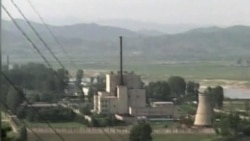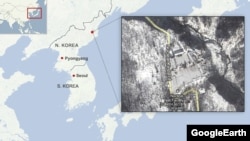North Korea defied international warnings Tuesday and carried out its third nuclear test, drawing immediate condemnation from leaders around the globe.
Pyongyang said the "successful" test was in response to what it called the "reckless hostility" of the United States, which has led the global charge toward expanding sanctions against the communist state.
State media said the underground test used a lighter, smaller nuclear bomb with greater explosive force than previous tests - raising fears Pyongyang has achieved a breakthrough in miniaturizing the technology.
Following the test, the North's Foreign Ministry defiantly warned of unspecified additional measures. South Korea has already placed its military on alert and hinted at the possibility of additional North Korean nuclear tests or missile launches on Tuesday.
The U.N. Security Council is holding an emergency meeting later Tuesday in New York to discuss the test, which prompted an outpouring of global criticism.
U.N. Secretary General Ban Ki-moon immediately condemned the "deeply destabilizing" test, calling it a "clear and grave violation" of international sanctions.
U.S. President Barack Obama called the test "highly provocative," saying it threatens U.S. security and international peace. He called for "swift and credible" action by the international community.
China, North Korea's main ally, expressed what it called "firm opposition" to the test. It also took the rare step of summoning the North Korean ambassador to let Pyongyang know it was "strongly dissatisfied and resolutely opposed" to the test.
North Korea for weeks had threatened to carry out its third nuclear test in retaliation for United Nations sanctions that were expanded in response to a December long-range rocket launch.
Initial reports suggest North Korea's latest nuclear test was stronger than its previous tests in 2006 and 2009. A South Korean Defense Ministry spokesperson said the explosion generated 6-7 kilotons.
Security analyst Michael McKinley with the Australian National University says it is important to determine in the coming days whether North Korea used plutonium or highly-enriched uranium to conduct the test.
"The crucial evidence here will be whether they used plutonium as they did in the other two [nuclear tests], or whether they've used uranium in this one. That would represent of course that they've got a secret uranium enrichment program," he said.
In 2009, Pyongyang announced it would begin enriching uranium, possibly giving it a second way to make fuel for nuclear weapons. Experts say uranium-enrichment programs are more sustainable and easier to hide in secret facilities.
Pyongyang said the "successful" test was in response to what it called the "reckless hostility" of the United States, which has led the global charge toward expanding sanctions against the communist state.
State media said the underground test used a lighter, smaller nuclear bomb with greater explosive force than previous tests - raising fears Pyongyang has achieved a breakthrough in miniaturizing the technology.
Following the test, the North's Foreign Ministry defiantly warned of unspecified additional measures. South Korea has already placed its military on alert and hinted at the possibility of additional North Korean nuclear tests or missile launches on Tuesday.
North Korea's nuclear and missile program
North Korea's nuclear and missile program:- August 1998: Test fires Taepodong-1, its first long-range rocket.
- September 1999: Pledges to freeze long-range missile tests amid improving ties with U.S.
- March, 2005: Ends moratorium on missile tests, blames "hostile" policy of U.S.
- July 5, 2006: Test fires long-range Taepodong-2, which fails less than a minute after launch.
- July 15, 2006: U.N. Security Council demands Pyongyang halt missile program.
- October 9, 2006: Conducts first underground nuclear test.
- October 15, 2006: U.N. Security Council demands halt to missile and nuclear tests, bans sale of weapons
- April 5, 2009: Launches long-range rocket that lands in Pacific. Claims success, but U.S. says no satellite placed in orbit.
- April 13, 2009: U.N. Security Council condemns launch, tightens sanctions. Pyongyang quits six-party nuclear talks.
- May 2009: Conducts second underground nuclear test.
- June 2009: Security Council imposes tougher sanctions.
- February 2012: Announces moratorium on nuclear and long-range missile programs in exchange for U.S. food aid.
- April 2012: Launches long-range rocket, which falls apart shortly after lift-off.
- December 2012: Launches Unha-3 rocket, and declares success in placing satellite in orbit.
- January 2013: U.N. Security Council condemns December rocket launch, North Korea says it will conduct a third nuclear test.
-
February 2013: Conducts third nuclear test.
U.N. Secretary General Ban Ki-moon immediately condemned the "deeply destabilizing" test, calling it a "clear and grave violation" of international sanctions.
U.S. President Barack Obama called the test "highly provocative," saying it threatens U.S. security and international peace. He called for "swift and credible" action by the international community.
China, North Korea's main ally, expressed what it called "firm opposition" to the test. It also took the rare step of summoning the North Korean ambassador to let Pyongyang know it was "strongly dissatisfied and resolutely opposed" to the test.
North Korea for weeks had threatened to carry out its third nuclear test in retaliation for United Nations sanctions that were expanded in response to a December long-range rocket launch.
Initial reports suggest North Korea's latest nuclear test was stronger than its previous tests in 2006 and 2009. A South Korean Defense Ministry spokesperson said the explosion generated 6-7 kilotons.
Security analyst Michael McKinley with the Australian National University says it is important to determine in the coming days whether North Korea used plutonium or highly-enriched uranium to conduct the test.
"The crucial evidence here will be whether they used plutonium as they did in the other two [nuclear tests], or whether they've used uranium in this one. That would represent of course that they've got a secret uranium enrichment program," he said.
In 2009, Pyongyang announced it would begin enriching uranium, possibly giving it a second way to make fuel for nuclear weapons. Experts say uranium-enrichment programs are more sustainable and easier to hide in secret facilities.









